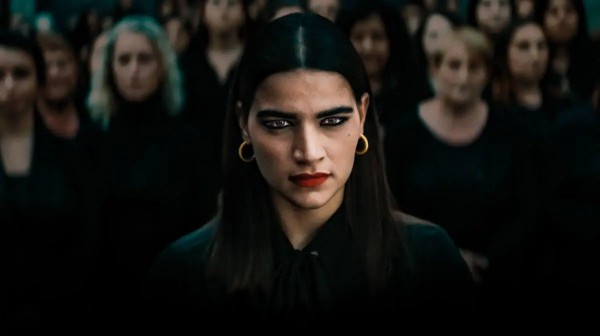FRANCESCO COSTABILE: THE CODE OF SILENCE/UNA FEMMINA (2022) - OPEN ROADS: NEW ITALIAN CINEMA AT LINCOLN CENTER (JUNE 9-15, 2022)  LINA SICILIANO IN UNA FEMMINADark explorations of a fearless girl
LINA SICILIANO IN UNA FEMMINADark explorations of a fearless girl Francesco Costabile's first feature in a way couldn't be more Italian, if Italy to you is the south and the mafia. The focus is Calabria, and the entire film is in thick Calabrian dialect. In the foreground is a young woman, Rosa (the deep, dark, heavy-featured Lina Siciliano; Mauro Donzelli of the Italian film site
ComingSoon speaks of her "antique face"), who wants to explore or expose the past, pull away the dark curtains of her mother's mysterious death when she was a young girl. Rosa is supposed to be still only a teenager now, but her dark Mediterranean features carry a weight that makes her seem older, even ancient. Maybe she already knows everything she wants to find out. Hovering over all, the family and formerly warring clans that have held a truce till now, is La ‘Ndrangheta, the mafia's local version and the code of omertà, not telling, shared silence.
The beauty of the dark images of dp Giuseppe Maio makes up - for a long time, anyway - for the paucity of information and the tendentiousness of the scenes, which at first are little whispered chiaroscuro sketches, expand to big, dark, ceremonial encounters. The sepia hazes and early scenes half out of focus are at once threatening and sensuous. For a while the campy chiaroscuro made me think of Visconti's 1965
Sandra/Vaghe stelle dell'Orsa, though that film tells a very different and much clearer story. Midway the screen opens up to a building in flames, a barn provocatively torched, and it's magnificent after all the darkness and the claustrophobic black-clad figures. Costabile fetishizes repression by how beautiful he makes the darkness and the silences. I thought of some old-timey, grandiose comic book, "Prince Valiant" perhaps, as well as Phil Tippett's recently released
Mad God. When it reaches a fever pitch of gruesomeness, it could evoke the American photographer of death, Joel-Peter Witkin. It's soporific, but it's also hypnotic, mysterious and terrifying, even though Rosa seems afraid of nothing.
Rosa's question-asking is an act of rebellion, which links her with her vanished mother, who evidently was guilty of some infraction that required the ultimate wiping-clean. The scenes of the film depict repression being pushed back against, with the threat of something about to explode. Things do explode in the second half, the long-repressed feuds breaking out again in an orgy of revenge touched off by Rosa's revenge for the death of her mother. Rosa disrupts the established power structures: one is the longstanding truce between her uncle Salvatore (Fabrizio Ferracane,
Il Traditore) and his arch-rival Ciccio (Vincenzo Di Rosa), which the vengeful Rosa secretly sabotages. By then she has become such a heavy dude, the enemy capo wants her. And in the final shot, as Rosa enters a tunnel shot leading to a cosseted car ride, he may have gotten her; or is she turning state's witness? At least she has already lost her rough gamine look and become sleek and soignée. But nothing very clear has happened. Costabile has proved good at atmosphere and great at moody visuals but a washout at telling a coherent story.
This was all "freely inspired" by the book by
Espresso magazine investigative journalist Lirio Abbate,
Fimmine ribelli. Come le donne salveranno il paese dalla n'drangheta, "Rebellious Females. How Women Will Save the Country from the 'Ndrangheta." (The convoluted plot thus "inspired" is by screenwriting duo Adriano Chiarelli and Serena Brugnolo, reportedly with some involvement by Abbate.) But does Rosa 'save' the country from the Calabrian syndicate, or join it? Costabile's film apparently chooses to use the book and his formidable female protagonist in mainly atmospheric, ambiguous, ambivalent ways. He's an artist, half in love with easeful death, and not a muck-raker. Muck is the medium he paints with.
The Code of Silence/Una femmina, 120 mins., debuted at the Berlinale Panorama section in Feb. 2022 and opened theatrically in Italy then also. It was screened for this review as part of the 14-film Jun. 9-15, 2022 FLC-Cinecittà, Open Roads: New Italian Cinema series at the Walter Reade Theater.
Saturday, June 11 at 5:30pm (Q&A with Francesco Costabile)





